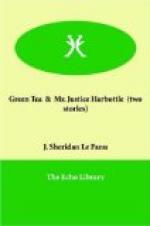The indictment was read. Judge Harbottle actually pleaded! He pleaded “Not Guilty.” A jury were sworn. The trial proceeded. Judge Harbottle was bewildered. This could not be real. He must be either mad, or going mad, he thought.
One thing could not fail to strike even him. This Chief-Justice Twofold, who was knocking him about at every turn with sneer and gibe, and roaring him down with his tremendous voice, was a dilated effigy of himself; an image of Mr. Justice Harbottle, at least double his size, and with all his fierce colouring, and his ferocity of eye and visage, enhanced awfully.
Nothing the prisoner could argue, cite, or state, was permitted to retard for a moment the march of the case towards its catastrophe.
The chief-justice seemed to feel his power over the jury, and to exult and riot in the display of it. He glared at them, he nodded to them; he seemed to have established an understanding with them. The lights were faint in that part of the court. The jurors were mere shadows, sitting in rows; the prisoner could see a dozen pair of white eyes shining, coldly, out of the darkness; and whenever the judge in his charge, which was contemptuously brief, nodded and grinned and gibed, the prisoner could see, in the obscurity, by the dip of all these rows of eyes together, that the jury nodded in acquiescence.
And now the charge was over, the huge chief-justice leaned back panting and gloating on the prisoner. Every one in the court turned about, and gazed with steadfast hatred on the man in the dock. From the jury-box where the twelve sworn brethren were whispering together, a sound in the general stillness like a prolonged “hiss-s-s!” was heard; and then, in answer to the challenge of the officer, “How say you, gentlemen of the jury, guilty or not guilty?” came in a melancholy voice the finding, “Guilty.”
The place seemed to the eyes of the prisoner to grow gradually darker and darker, till he could discern nothing distinctly but the lumen of the eyes that were turned upon him from every bench and side and corner and gallery of the building. The prisoner doubtless thought that he had quite enough to say, and conclusive, why sentence of death should not be pronounced upon him; but the lord chief-justice puffed it contemptuously away, like so much smoke, and proceeded to pass sentence of death upon the prisoner, having named the tenth of the ensuing month for his execution.
Before he had recovered the stun of this ominous farce, in obedience to the mandate, “Remove the prisoner,” he was led from the dock. The lamps seemed all to have gone out, and there were stoves and charcoal-fires here and there, that threw a faint crimson light on the walls of the corridors through which he passed. The stones that composed them looked now enormous, cracked and unhewn.
He came into a vaulted smithy, where two men, naked to the waist, with heads like bulls, round shoulders, and the arms of giants, were welding red-hot chains together with hammers that pelted like thunderbolts.




